| Welcome to the LOUDEST DOT COM ON THE PLANET! | |
 |

|
| Welcome to the LOUDEST DOT COM ON THE PLANET! | |
 |

|
Exclusive: Judas Priest's Glenn Tipton Still Ripping It Up By Jeff Kerby, Contributor Tuesday, September 10, 2002 @ 1:25 PM
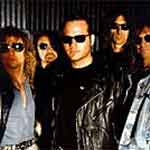 Since the beginning of the Ripper era six years ago, Priest have managed to produce two studio discs as well as a live album and a DVD entitled Live in London. Sometimes critics like their new material and sometimes they donít, but the reality is that Judas Priest have always been committed to enhancing the legacy they started for themselves way back in the days of Rocka Rolla and Sad Wings of Destiny. If close to thirty years of metal mayhem have proved anything, itís that a group with this mixture of longevity and credibility is as rare as a bad guitar solo from Tipton -- thatís why he, as well as his band, have undeniably set a hard rock standard for the ages.
KNAC.COM: Watching the DVD, it seems like you guys are having a good time. How much cutting did they have to do to splice all of that together, or are you just generally content out on the road?
Since the beginning of the Ripper era six years ago, Priest have managed to produce two studio discs as well as a live album and a DVD entitled Live in London. Sometimes critics like their new material and sometimes they donít, but the reality is that Judas Priest have always been committed to enhancing the legacy they started for themselves way back in the days of Rocka Rolla and Sad Wings of Destiny. If close to thirty years of metal mayhem have proved anything, itís that a group with this mixture of longevity and credibility is as rare as a bad guitar solo from Tipton -- thatís why he, as well as his band, have undeniably set a hard rock standard for the ages.
KNAC.COM: Watching the DVD, it seems like you guys are having a good time. How much cutting did they have to do to splice all of that together, or are you just generally content out on the road? TIPTON: Obviously, you know, the camera is rolling, so youíre going to be happy, I suppose. We ended up giving them a lot of footage, and the guy who put the video together just used the pieces he liked. KNAC.COM: How long did they follow you around? TIPTON: Not very long. What we did is, we only recorded the one show -- thatís it. A lot of bands will record half a dozen shows and just pick the best. We wanted a concert. Other than that, we took a digital video camera on the road with us in Japan. We just shot some backstage footage to be interspersed with the concert footage. KNAC.COM: On Live in London, the sound check, for example, seems to sound really tight -- was it so good because you knew it was going to be documented, or is that just indicative of a regular preparation for the show? TIPTON: Again, normally you donít have a mobile sound studio with you at sound check, so the sound is going to be clear. Everything technical was taken care of beforehand. The only piece on there that isnít live is ďLost And FoundĒ because we did a lip sync video of that song it in the afternoon. Everything else was played exactly as you hear it. KNAC.COM: What was the biggest obstacle in trying to capture a live show onto a DVD format? TIPTON: Mostly, we just had a lot of faith in the guy. In the old days, we used to really keep on top of everything and nothing would go by without us having a hand in it, but in this instance, we were out on the road and everything, and we really couldnít do it. I just had faith in the guy who produced it, and he did a really good job. 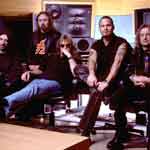 KNAC.COM: For example when you look back now and see the video for ďBreaking the Law,Ē what do you think about it? Do you think believe any of Priestís earlier videos stand the test of time?
KNAC.COM: For example when you look back now and see the video for ďBreaking the Law,Ē what do you think about it? Do you think believe any of Priestís earlier videos stand the test of time? TIPTON: I donít know really. I guess you just get used to yourself getting older. I never really have to look at the old stuff or listen to any of the older albums. I just try to focus on the future. When we did the remastering, I did spend a lot of time listening to the older stuff -- it was great. Even though we play a lot of the older stuff on stage, there are still a lot of numbers that I had overlooked and almost forgotten about. KNAC.COM: So youíre saying that you never just go and listen to something like Sad Wings of Destiny just for recreational purposes? TIPTON: Not really because after youíve written it, recorded it and played it around the world for thirty yearsÖ I do feel comfortable playing those songs on stage, though. You know, I do listen to them, but not very often. Iíve just always been someone who focuses on the future. KNAC.COM: Thereís a part on the DVD where after one of the songs you turn to the camera and say that you should get a ďproper job now.Ē How much of your involvement in music had to deal with you loving the guitar, and how much had to do with you wanting to get out of your environment? TIPTON: It was really wanting to get out of the environment I was in that gave me the determination to do something else in my life. I just happened to choose music. At the time in my life, I wasnít a music fanatic. Some kids now will start playing the guitar at four or five, but I didnít really start until I was eighteen or nineteen. I worked in a factory for five years, and boy, I wasnít wanting that. Really, that was the order of events -- just trying to do something with my life. I just saw music as an option. My mother was a pianist and my brother played guitar, so thatís just the way it went. KNAC.COM: With that being your background, were you ever able to take success for granted or did part of you always remain in that factory? TIPTON: Judas Priest never had it easy or any lucky breaks, really. We had to work really hard and tour excessively to get our music across. With the exception of ďAnother Thing CominíĒ we really havenít got a lot of airplay. In the old days, when the disc jockeys played whatever they wanted to play, we were more prone to getting airplay. The majority of our career though, weíve had to make the most of our luck. KNAC.COM: Do you think that today more than any other time that it is difficult to garner airplay because everything is so predetermined? TIPTON: Yeah, well when I first started coming over to the States, the joy for me was that I could get into a car and go through the stations and find a character disc jockey who was playing his own stuff. He was just playing whatever he wanted to play -- Zeppelin, whatever -- or even more extreme bands. Now all of it, or so Iím told, is corporate and it depends on whether the hierarchy decides to play it or not. It certainly comes across like that now. I donít hear the characters at the radio stations playing the wealth of things that they used to -- I donít mean dated stuff either. It just seems to me that if the bandís in vogue, theyíll play it, and if not, thereís a lot of good bands being overlooked.
TIPTON: Well, thereís got to be a point. Itís like the end of the universe. Thereís gotta be an end somewhere, you know. Iíll know that time, and thatís all I can say. At the moment, I feel that Iíve got the enthusiasm, and I enjoy playing more than ever. I wonít carry on if Iím not enjoying it. I wonít do live performances if Iím not enjoying it because Iíd be shortchanging the kids. I would probably never give up the music though -- I definitely intend on doing another solo album. Priest will always be the priority in my life, but when Priest is over, Iíll probably produce a couple of other bands. What I really love is film music, you know, I love when you get an average piece of footage and an average song, but when you put the two together it becomes something more. When my days in Priest are over -- and Iím not morbidly talking about it -- things wind down in a slow way really. Who knows? Maybe I would just stop music and go fishing or something. KNAC.COM: Thatís unlikely though, isnít it? Wouldnít music always be a part? TIPTON: My sonís a guitar player, and heís just learning the ropes, so I would probably just do stuff for him. Iíve got a studio at home, too. Yes, I would think music would always be a part in some way, although nobodyís got a crystal ball. KNAC.COM: You have created music with John Entwistle and knew him. How did his death affect you? TIPTON: He played on Baptism of Fire, and he was the most amazing bass player. Unfortunately, Cozy Powell died about four years ago, and he had also played on my album. Cozy and I were in the studio, and I asked John if he would like to play some tracks on Sunday. He said, ďYeah, Iíll come down.Ē He was a real character, and he just struck up in the studio. It couldnít have been anybody else but John Entwistle. Not only did he have a striking style, but he could play any kind of bass. He had an amazing collection of guitars -- not just bass guitars. He probably had one of the best collections in the world. He was just a total bass player. Iíve actually got quite a few tracks with John and Cozy on them. It might be the thing I do next because youíve got to have a good reason to do a solo album. My last one was done when I thought that Priest was all over, so it was a good reason to do one. That way it wasnít misconstrued as an ego trip where I just go and show off what I can do, but instead my emphasis was on songs and the fact that we didnít have a singer at the time. Now, Iíve been looking for a reason to do another one because Iím very prolific, and Iíve written a lot of stuff. Basically, Iíve got a whole album with Cozy on it, and John is on a number of the tracks as well. I think it would be a nice thing to do the album and dedicate it to themÖ just let people hear what they played. I just donít want people to think that I am cashing in on it or anything. It was a tragedy, really. At some point I really want to do it because the songs are already done and they just have to be mixed. There is some incredible playing from both of them. KNAC.COM: How hard of a decision was it to postpone the US leg of the Demolition Tour after 9/11? 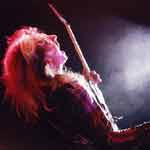 TIPTON: Physically, we couldnít do it. There wasnít a problem as far as we were concerned on a safety level. We werenít worried about going out into all this terrorist activity or anything. That didnít bother us at all. We were in Mexico City, and we were about to fly into America that day when the tour manager called. We ended up being stuck there for four or five days, and the equipment was impounded. We just arenít a band who can go out and use other peopleís equipment. That, and we just thought that it would be disrespectful to go out with an album called Demolition with a support act called Anthrax. We just felt like it was disrespectful, and we really couldnít have done it anyway. Since we didnít have any equipment, we just had to push it back. It took a lot of momentum away from the album. We are a band that tours after an album, and when that album is six months oldÖ wellÖ they probably arenít going to play the album anyway. Either way, I donít have anything to moan about -- not like those people who suffered on that tragic day.
KNAC.COM: How fortunate do you feel to have a musical relationship with KK Downing? Basically someone who has always been there. How special is that?
TIPTON: Physically, we couldnít do it. There wasnít a problem as far as we were concerned on a safety level. We werenít worried about going out into all this terrorist activity or anything. That didnít bother us at all. We were in Mexico City, and we were about to fly into America that day when the tour manager called. We ended up being stuck there for four or five days, and the equipment was impounded. We just arenít a band who can go out and use other peopleís equipment. That, and we just thought that it would be disrespectful to go out with an album called Demolition with a support act called Anthrax. We just felt like it was disrespectful, and we really couldnít have done it anyway. Since we didnít have any equipment, we just had to push it back. It took a lot of momentum away from the album. We are a band that tours after an album, and when that album is six months oldÖ wellÖ they probably arenít going to play the album anyway. Either way, I donít have anything to moan about -- not like those people who suffered on that tragic day.
KNAC.COM: How fortunate do you feel to have a musical relationship with KK Downing? Basically someone who has always been there. How special is that? TIPTON: I think weíre fortunate that the guitar solos just blend together in a way that enhances the character of Priest. Itís nothing we really have to work at, itís just one of those freak things. His style and my style just work well together in the band. That being said, Ian has his own style and Scott has been with us for twelve years as well. We are fortunate that we have that character inherent in a band. Itís something you should really cherish. Fortunately, all of it just makes up the Judas Priest sound, and weíve never tried to stray from it because we realize the value of it. Itís great. KNAC.COM: Is it satisfying to know that even during the early nineties, when everyone in the mainstream press was discrediting metal, that Priest continued to create heavy music? TIPTON: Yeah, I mean people often ask me the secret of Priest, and how we keep going. The only thing I can say is that every night we set foot on that stage, we enjoy ourselves. We have always believed in heavy metal and Judas Priest. Itís that love genuine love for heavy metal and Judas Priest that has really kept us going. I think a lot of other bands go through the motions or do it for the bucks. We donít. We are really proud of what weíve written in our repertoire. I do want to say though, that we have evolved, even though we havenít really strayed from metal. Thatís important because if you donít evolve in some way, youíre dead as a doormat really. Weíve just managed to do it while staying true to our sound. KNAC.COM: Do you ever feel that when an album is criticized that maybe some of the critics need to catch up with you? The Turbo record being an example of a disc that wasnít received as well as it should have been, but that nevertheless has managed to stand up over time. That seems to have been the case with a lot of Priest albums.  TIPTON: Our catalogue is amazing because, with all of the remasters and stuff, there are so many more of our records going platinum. Weíve gotten used to it though. People used to be critical of Point of Entry, but it has strong material, ďDesert Plains,Ē ďSolar Angels,Ē and ďHot Rockin,íĒ so it had something to offer. Turbo may have been before its time in a sense. At first, people said that we were straying from the metal path and all, but over time, they came around. We never really do what people expect of us, and thatís the thing with Priest. There are always some disappointed people initially, but every album is always different, yet it is inimitably still Judas Priest. Every album is a different mood. Itís a different reflection of how we feel up to that portion of time. It just takes people time to get used to it. Itís like with Jugulator, for instance, it was our first one with Ripper, and it was a very fierce album. Many thought though that it didnít have enough melody. A lot of people have come around though and said, ďI really liked Jugulator.Ē It will be the same with Demolition, but you canít please everybody. On a Judas Priest album, everybody will probably like five or six songs, and the others they may not. The thing is though, that someone will like the songs that the other person didnít.
KNAC.COM: Donít you think that shows a varied style within those albums?
TIPTON: Our catalogue is amazing because, with all of the remasters and stuff, there are so many more of our records going platinum. Weíve gotten used to it though. People used to be critical of Point of Entry, but it has strong material, ďDesert Plains,Ē ďSolar Angels,Ē and ďHot Rockin,íĒ so it had something to offer. Turbo may have been before its time in a sense. At first, people said that we were straying from the metal path and all, but over time, they came around. We never really do what people expect of us, and thatís the thing with Priest. There are always some disappointed people initially, but every album is always different, yet it is inimitably still Judas Priest. Every album is a different mood. Itís a different reflection of how we feel up to that portion of time. It just takes people time to get used to it. Itís like with Jugulator, for instance, it was our first one with Ripper, and it was a very fierce album. Many thought though that it didnít have enough melody. A lot of people have come around though and said, ďI really liked Jugulator.Ē It will be the same with Demolition, but you canít please everybody. On a Judas Priest album, everybody will probably like five or six songs, and the others they may not. The thing is though, that someone will like the songs that the other person didnít.
KNAC.COM: Donít you think that shows a varied style within those albums? TIPTON: Definitely. KNAC.COM: It has been said that the inclusion of Ripper into Judas Priest infused some much-needed energy into the band. Do you see yourselves carrying on Priest longer than you would have simply because he brings a certain vibrance to the table? Would we even be having this discussion if you hadnít found Ripper? TIPTON: No, there wouldnít be a Priest. Ripper is the only guy in the world who could have taken over for Rob. Thereís no doubt about it. We looked for five years, and we had a short list of ten incredible singers out of the thousands that we looked at. They were tremendous singers, but they werenít Judas Priest singers. I knew that going into the auditions -- these were great singers, but we didnít have a Judas Priest singer until he walked in the door. KNAC.COM: You did know pretty quickly that he was the guyó TIPTON: First line. First line he sung -- we knew. It was that simple. Suddenly, we were just awestruck. Like I said, if it wasnít for Ripper, there wouldnít be a Priest now. The thing with Ripper and Rob and the comparisons is that I suppose Rob is a better lyricist, but Ripper is getting good now. He actually chose to back off on the writing because there was a formula there. He wanted to leave that alone until he got more comfortable. Itís only our second studio album together. To say that he is getting more confident now is ridiculous though because he had it from day one, but he does feel a lot more comfortable now. Weíve started to write together, and he felt right -- not to us, but to himself. He was the one who said, ďgive me a couple of studio albums and then I will feel entitled to be involved.Ē Add the fact that Ripper has got an incredible richness in his voice, and he actually has greater range than Rob. Iíll never say a bad thing about Rob though -- he was a fantastic singer. Ripper has those qualities too, but he also has certain areas that I know that I can work with as a writer that are still untapped. Thatís exciting. KNAC.COM: Is that the challenge? TIPTON: Actually, itís not a challenge. Nothing is a challenge with Tim because he is so talented, but itís exciting because there are new paths to go down. Thatís probably what we need at this stage in our career. Weíve written fifteen or sixteen albums, and now we have new paths to go down. It wonít change the character of the band though because the weird thing is that anything he sings is Priest even if itís slightly different. Itís all Judas Priest. 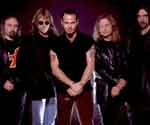 KNAC.COM: Does it bother you that in the hundreds of interviews that you do that Rob is invariably going to come up at some point?
KNAC.COM: Does it bother you that in the hundreds of interviews that you do that Rob is invariably going to come up at some point? TIPTON: No, itís inevitable that people will ask. Rob was a big part of this band, and he was with us for twenty-five years. I think people do tend to forget though that Tim has been with us for six years now, too. Weíve done the DVD together, a live album as well as two studio albums together, and he has put so much into this band. It doesnít bother me. Iím sure we will always be asked about Rob. KNAC.COM: Which part of the US do you consider your home away from home? Is there any part that seems to support you just a little more than the others? TIPTON: Thatís difficult really because weíve always been fortunate. Weíve been popular across the board. Some bands are west coast bands, and some are east coast, but we have been lucky to be popular across the board. KNAC.COM: Do you already have a lot of ideas for the next album stored up after being on the road? TIPTON: No, not at all. Never. Nearly every tour I get my guitar and a little tape recorder, and I think Iím going to write the next album. Then though, when I get back to the room, itís the last thing I want to do. You just drain yourself, and thereís very little creativity. The way Iíve always worked is, I give everything on tour and play my heart and soul out, and then take a break. Sometimes itís a really long break -- not just weeks but months. I wonít even pick up a guitar during that time, but when I do, thatís when Iím most creative. KNAC.COM: What do you do during those in between times? TIPTON: I travel. I love my home and family. Iíve also got motorbikes and fly mobile planes. You name it, I do it. I just take a complete break from music. The way Iíve always been is that if I put the guitar down, Iíll eventually want to pick it back up again, and when I do, thatís when I really have to capture everything on tape. Thatís when the ideas come. Iíve always been like that. If I played the guitar every day, Iíd just get sick of it. KNAC.COM: You do seem to put so much into your playing on tour -- how has your live show changed most significantly since the eighties? 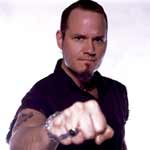 TIPTON: Itís definitely changed. Weíre not going to kid ourselves -- we arenít playing massive arenas every night anymore, and in the mid eighties, thatís what we were doing. Some nights we may play to a thousand people and other nights we may play to twenty. We just headlined some festivals in Europe, and there were twenty thousand people there. In other areas though, we may do a thousand or two. It usually ranges between those two points. I actually love the smaller gigs, and if youíve never seen Priest in a smaller gig, youíve actually never seen the band. In the eighties, the band was bigger than life. If you play in a bigger arena, youíve got to exaggerate everything, so we did. Priest hasnít really been about that, though. What Priest is about [is] the depth of the songs that weíve got. The best place in the world to hear ďVictim of ChangesĒ is a small venue. Our material is really out strength. The production is just a bonus.
KNAC.COM: Is there any difference in your perception whether youíre playing to twenty thousand or to two?
TIPTON: Itís definitely changed. Weíre not going to kid ourselves -- we arenít playing massive arenas every night anymore, and in the mid eighties, thatís what we were doing. Some nights we may play to a thousand people and other nights we may play to twenty. We just headlined some festivals in Europe, and there were twenty thousand people there. In other areas though, we may do a thousand or two. It usually ranges between those two points. I actually love the smaller gigs, and if youíve never seen Priest in a smaller gig, youíve actually never seen the band. In the eighties, the band was bigger than life. If you play in a bigger arena, youíve got to exaggerate everything, so we did. Priest hasnít really been about that, though. What Priest is about [is] the depth of the songs that weíve got. The best place in the world to hear ďVictim of ChangesĒ is a small venue. Our material is really out strength. The production is just a bonus.
KNAC.COM: Is there any difference in your perception whether youíre playing to twenty thousand or to two? TIPTON: None at all. Actually, we probably give more to smaller audience than we do to a larger one. KNAC.COM: In what way? TIPTON: I donít know what it is really. Itís just that youíre right there with them, and I think we put out more energy. KNAC.COM: Everyone usually just thinks about the good parts about being in a successful rock band. What do you think has been the biggest drawback? TIPTON: Itís taken away time from my family. Like this summer, Iíve lost this whole summer with my son and daughter. My daughter is twenty-one and my son is sixteen, but it would probably be the last summer I would have gone off with him and done something. Thatís been the biggest sacrifice -- just being away from home. You do what youíve got to do though, and weíre really lucky to do this and have a fan base thatís very loyal. We are lucky to be in Judas Priest and have fans as enthusiastic as they are. There probably isnít one day where I donít turn around and say just how happy I am with my situation in life.
| |||||||
|
|
| Recent Features |
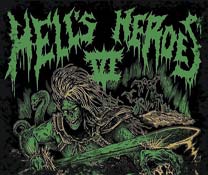 |